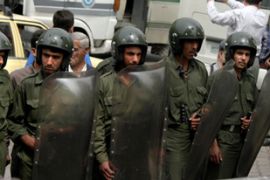Syrian prisoners ‘disappeared’
Two years after unrest in Saydnaya jail, relatives of 52 inmates await news of their fate.

Syrian human rights organisations say that on the day of the disturbances, security forces were sent to the prison, and now fear that many of the missing men could have been killed in ensuing violence.
Ambulances were seen heading from the prison to a military hospital later that day, and the hospital was closed to the public for several weeks after the incident, leaving families unsure whether their relatives had survived.
Families ignored
The families have repeatedly been blocked from discovering what happened to their relatives, prompting fears that their deaths are being covered up by Syrian security forces.
One of the prisoners, Basel Madarati, was due for release in January after serving a five year sentence, but never appeared.
|
“I am a human being and I have the right to demand the disclosure of my son’s whereabouts” Prisoner’s father |
Following the violence at the prison, his father had been told that he was not allowed to visit his son, and then that he had been transferred out of the prison to face interrogation at a military intelligence complex in Damascus.
But when his father went to the complex, he was threatened with arrest if he returned to the site.
“I am a human being and I have the right to demand the disclosure of my son’s whereabouts,” he said, adding that other prisoners released from Saydnaya have told him that Basel was killed in the unrest.
Nizar Ristnawi, a prominent human rights activist who was serving a four year sentence at Saydnaya for “spreading false news” when the violence broke out, has also disappeared.
More than a year has passed since he was due to be released.
The UN working group on arbitary detention has criticised his imprisonment and called on the Syrian government to “take the necessary steps to remedy his situation”.
The families of the missing men have sent letters and petitions to Bashar al-Assad, the Syrian president, asking to know what has happened to their relatives, but have received no response.
One group of 17 mothers whose sons were held in the prison penned a joint letter asking for information after they heard rumours of secret night-time burials taking place in the town of Qatana.
Difficult case
There are reports that former Saydnaya detainees have been threatened with arrest if they discuss the fate of missing men, and they have refused to talk to the families or human rights groups working on the case.
Human rights lawyers say that even by Syrian standards, the case of the missing prisoners is one of the most challenging they have worked on.
“As lawyers and activists we have not confronted a situation that is more difficult than the Saydnaya events,” one lawyer, who wished to remain anonymous, told the human rights group Amnesty International.
“It is a collective case that affects hundred of people and includes dead victims, which is different from the usual cases of arrest and detention.”
“We can’t access information no matter how trivial it may be, neither from the authorities who are reticent on the events despite the passing of time, nor from the prisoners who were later released and refuse to tell us anything out of fear of re-arrest.”
Syria has long been linked with the enforced disappearance of prisoners. The fate of thousands of prisoners captured over the years remains unknown, prompting condemnation from Syrian and international human rights groups.
Syrian officials contacted by Al Jazeera declined to comment on the allegations.